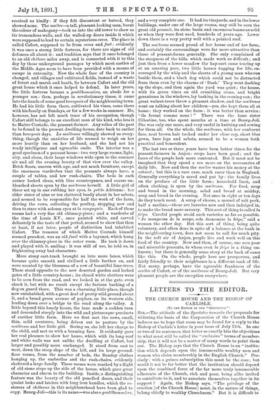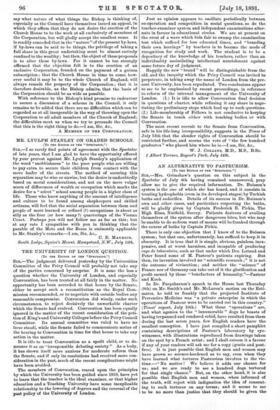LETTERS TO THE EDITOR.
THE CHURCH HOUSE AND THE BISHOP OP CARLISLE.
[TO THE EDITOR OF THE " SPECTATOR...1
SIB,—The attitude of the Spectator towards the proposals for widening the basis of the Corporation of the Church House induces me to hope that room may be found for a reply to the Bishop of Carlisle's letter in your issue of July 11th. In one or two of its sentences, that letter so exactly hits the objections to what must still be called the " exclusive" terms of member- ship, that it will not be a matter of many words to point them out. The Bishop says that the Church House is an "institu- tion which depends upon the innumerable wealthy men and women who claim membership in the English Church." Pre- cisely : with a guinea subscription this must be the case ; but would it not be far better that the institution should depend upon the combined force of the far more truly innumerable adherents of the Church, rich and poor, being alike invited to contribute to it, and to associate themselves together in its support ? Again, the Bishop says, "The privilege of the erection [of the Church House] must, in the nature of things, belong chiefly to wealthy Churchmen." But it is difficult to
say what nature of what things the Bishop is thinking of, especially as the Council have themselves issued an appeal, in which they affirm that they do not desire the erection of the Church House to be the work at all exclusively of members of the Corporation, but will gladly accept the smallest sums. It is readily conceded that in the " nature" of the present by-laws, if by-laws can be said to be things, the privilege of taking a full share in this great undertaking must be almost entirely confined to the wealthy ; but then, the object of these proposals is to alter these by-laws. For it cannot be too strongly affirmed that the objection felt is to the erection of an exclusive Corporation, founded on the payment of a guinea subscription ; that the Church House in time to come, how- ever useful it may be to the whole Church of England, will always remain the property of the Corporation ; that it is therefore desirable, as the Bishop admits, that the basis of the Corporation should be as wide as possible.
With reference to the Bishop's kind promise to endeavour to secure a discussion of a scheme in the Council, it only remains to be added that there are no difficulties which can be regarded as at all insuperable in the way of throwing open the Corporation to all adult members of the Church of England; the difficulties meet us when we try to persuade the Council that this is the right thing to do.—I am, Sir, &c.,
A MEMBER OP THE CORPORATION.



















































 Previous page
Previous page